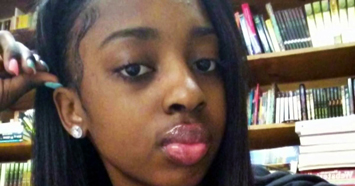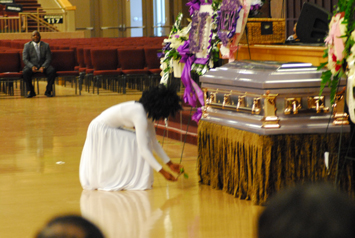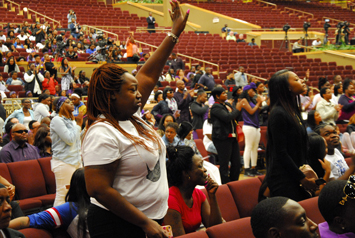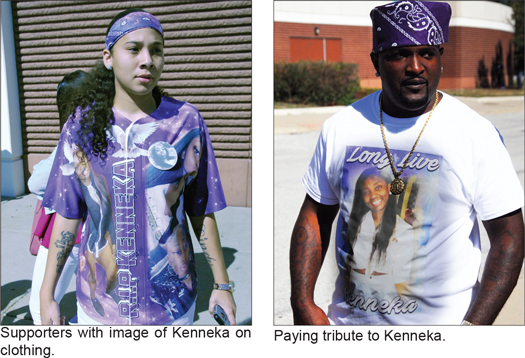Guiding, guarding and protecting our girls
By Starla Muhammad -Managing Editor- | Last updated: Oct 4, 2017 - 8:36:54 PMWhat's your opinion on this article?

Kenneka Jenkins
|
Kenneka was finally laid to rest on Saturday, Sept. 30. As her purple casket was pushed into the main auditorium at the Salem Baptist Church House of Hope, roughly 1,200 people consisting of family members, friends and those who just wanted to offer their condolences and show their support, looked on. Some cried, some hugged one another and Kenneka’s mother, Teresea Martin, while others expressed disbelief that such a young girl with her entire life ahead of her, could meet such a tragic end.
“We’re not here to solve this, we’re not here to ask questions,” said Pastor James Meeks of Salem Baptist Church. “We’re here to wrap our arms around a mother, a father, many aunts and uncles and friends who have lost a loved one.”
Still, despite the somber occasion, and through the pain and sadness, you could feel the expression of love present in the building. In fact, the call for Black people to love one another was one of the messages being spread throughout the duration of the funeral. The other was the need for young Black men, women, boys and girls, to not only value themselves, but also each other through a reconnection with God—something that seems to be missing and some cases, almost nonexistent these days within the Black community.
Proper guidance and showing the importance of making positive lifestyle choices and demonstrating why bonds of genuine friendship and sisterhood is critical to “save our girls,” said Black women mentors that work in various communities.
Protecting Black girls mentally, emotionally and physically is the responsibility of the Black community, they pointed out.
“As a mother, advocate, mentor, auntie and big sister, what went through my mind is that someone had brought harm to Kenneka and that to me it just spelled out so much more, than just oh, this child was found missing,” said La’Keisha Gray-Sewell, founder of the Girls Like Me Project, Inc., a Chicago-based organization that provides positive programming for Black girls.

|
The police investigation into what happened to Kenneka continues, even after her Sept. 30 funeral. Authorities said they are still tracking down individuals to interview that were reportedly inside the Crown Plaza Hotel room in Rosemont, Ill. during the party the night of Sept. 8 and the wee hours of the next morning. Several people have been interviewed already. There has been much speculation about the possibility of foul play or if drugs and alcohol may have been a factor. The autopsy was completed but results are pending (See Final Call Vol. 36 No. 51 and 52).
“To these kids out here I just want to say that you’ve got to protect your thoughts and you’ve got to protect your spirit,” Goddess Warrior the Poet, a local spoken word artist said during Kenneka’s service. “God will provide protection and everything that you need if you turn to Him and believe in who He is.”
Also, there was an outpouring of love and support for Ms. Martin, as well as other mothers around the city who have had to bear the pain of burying a son or daughter who have lost their lives due to violence or some other tragic circumstances.

A performance in front of the casket of Kenneka Jenkins, 19 who died in early September. The teen’s body was found in a walk-in freezer at the Crowne Plaza Hotel in Rosemont, Ill. Photos: Haroon Rajaee
|
“A lot of mothers have lost their children on the streets of Chicago and I don’t think anybody truly understands what that means—to be a mother, or a single mother, and have to bury your child,” Goddess Warrior told those in attendance. “There are children in here today who are mothers, and I want you to realize that being a mother is the toughest job in the world.”
While Kenneka Jenkins’ life only spanned 19 years, she will always be remembered by those who loved her and knew her best, and by those who were moved by the tragic circumstances surrounding her death.
“Some of us are best friends because of Kenneka,” said Pastor Andre Williams who delivered the eulogy. “She was sent here to serve a purpose—which she did—and that was to touch the world.”

Mourners gathered Sept. 30 for funeral services of Kenneka Jenkins at Salem Baptist Church House of Hope in Chicago.
|
Regardless of the results or outcome, Kenneka’s story is unfortunately not an isolated incident of young, Black females navigating dangerous and perilous situations and another Black mother is forced to bury her child.
According to the African American Policy Forum, in 2010, the homicide rate among Black girls and women ages 10-24 was higher than for any other group of females, and higher than White and Asian men as well. The rate of firearm deaths for Black girls and women ages 10-24 from 2008-10 was more than 6.5 times higher than White women and girls.
Of the 322,263 females reported missing between January and December in 2016, 36.7 percent were Black and age 17 or under, reported Black and Missing Foundation, Inc.
Black girls are more likely to be suspended or expelled from school and are just as disproportionately funneled through the school to prison pipeline as Black boys. Black girls are viewed as less sympathetic, less innocent and less in need of protection than their White counterparts by adults, noted a Georgetown Law study released in June of this year.
The void of culture and traditions in the Black community have eroded much of the foundation necessary to create a safe environment and platform for girls and young women to grow, thrive and be safe, explained, Ms. Gray-Sewell. There has also been an erosion of standards, she added.
“I think that is because of the technology obviously but then I also think that a lot of our elders who were the keepers of those standards, values and traditions are leaving here and there are gaps in between what they taught us and what’s currently being practiced.”

|
Who will step up and provide the caring, nurturing and protecting that Black girls need and deserve if they are seen by those inside and outside of their communities as less than deserving?
The Honorable Minister Louis Farrakhan like his teacher the Most Honorable Elijah Muhammad point out the limitless value of the female, in particular the sacredness of Black women and girls.
“Women are devalued in this society. It is heartbreaking to drive down certain streets in major cities and see beautiful women of every color, of every race, half nude and selling themselves to anyone who would purchase pleasure from them. Women have fallen so low, and it doesn’t seem that we, as men, care because some will put our women up to this kind of behavior for the sake of money,” said Min. Farrakhan in an address titled, “The Immeasurable, Limitless Value and Beauty of a Woman.”
“Once men are taught the knowledge of God, and the value of a woman, then men will kill to keep her safe. But because you don’t know her value, or yours, you play with her, devalue her, and laugh at her. How can she open her knees to you, and you impregnate her, and then walk away—without even a thought of responsibility?” he added.
During the same address, Min. Farrakhan shared a story from his days as a young Muslim working in a store in Elmhurst, New York.
“I saw two White policemen beating a young Black girl. It was my job to keep the store open, but when I saw those police beating that woman, I left the store and challenged the police,” he continued.

|
“These police thought I was crazy; and, evidently, to them, I was—but I was ‘crazy enough’ to try to protect a female. I warned them, with no F.O.I. (Fruit of Islam, the men of the Nation of Islam) around me, because Allah was sufficient for me. ‘Don’t put your hand on her!’ They put her in the car, and I went down to the station to make sure they didn’t,” said the Minister.
“Now, what gives a man that kind of strength, where he doesn’t fear death? It is love for your people and it is knowledge of the value of what that policeman was desecrating.”
Carla Morrison, founder of Sisters of Today and Tomorrow based in Atlanta, works with pre-teen and teen girls. Ms. Morrison said she tries to create and cultivate an environment of sisterhood so the girls understand why it is important for them to look out for one another.
“What I try to do with girls is create that sisterly bond where somebody is ‘awoke’ in the group. Somebody has to be alert,” she said. Some teens are not necessarily thinking about consequences and repercussions or understand that some people are not trustworthy, said Ms. Morrison.
She shared the story of one girl she mentors who could not understand why her mother was upset that she was meeting a boy at an event. The girl said she knew him because, it was her friend’s cousin, said Ms. Morrison. She shared what she told her young mentee at the time who today is now a college student.
“Do you really know that’s your friend’s cousin? How do you know that? Because she introduced you? Do you really know her?” I said if something would have happened to you at that ballgame, your mother would have been upset. She never met your friend and she doesn’t know this boy so why would you try and keep that from her?”
It is difficult for many girls to trust authority figures many times, even in their own families which is a challenge, explained Ms. Morrison.
Maryam K. Muhammad is an educator and founder of Heal Thy Life, a health and wellness organization for Black women. She also speaks to students in schools around Chicago and the country and said young, Black girls crave role models and for someone to engage with them on a positive level.
She told The Final Call she recently participated in a meeting with women activists in Chicago and the tragedy of Kenneka Jenkins and the struggles young, Black girls face was part of their discussion. There is no sisterhood in what many of our girls see, said Ms. Muhammad.
“For us, because we had it, now we’ve become more responsible to give it back. So, we have to teach them the ‘girl code’ or qualities of sisterhood so that they can build them and also be open to receiving what they have to say because a lot of them are coming up in broken homes, a lot of them have been raped. They carry all types of pain. You have to be ready not to be judgmental but to be open with these girls,” she said.
The girls she has had the opportunity to speak and work with just want someone to relate to and they respond to it positively.
“That’s what they love to see. It’s not just me or no I’m not this bad seed or the words that my mother is telling me at home out of her pain. So, it’s a cycle of pain with women and then these girls are out here being caught in these situations because they are really trying to just seek some attention, seek some love and learn what they feel instinctively being a female and they just don’t know the value of it.”
Ms. Gray-Sewell said it is also important to prop up and share the positive and successful stories of Black women and girls.
“For every one of those (sad) stories there are 10 more girls who spent their weekends filling out scholarship applications, volunteering, spending time with their grandparents, leaving off to go to college. There’s so much to celebrate. Just that same weekend we saw the young sister win the U.S. Open,” she said, referring to 24-year-old tennis champion Sloane Stephens.
“We have all but for the grace of God been in situations that we saw like Kenneka, that could have ended terribly for us, at least I have. Because I have been there and in those rooms and in situations like that and I know how I came out and I know that there was grace and mercy for me,” shared Ms. Gray-Sewell.
“There is no way in the world that I can give up on our daughters and our little sisters. There’s no way I can give up fighting and being an example for them so they can see what’s possible for them.”
(Bryan Crawford contributed to this report.)
INSIDE STORIES AND REVIEWS
-
-
About Harriett ... and the Negro Hollywood Road Show
By Rabiah Muhammad, Guest Columnist » Full Story -
Skepticism greets Jay-Z, NFL talk of inspiring change
By Bryan 18X Crawford and Richard B. Muhammad The Final Call Newspaper @TheFinalCall » Full Story -
The painful problem of Black girls and suicide
By Charlene Muhammad -National Correspondent- » Full Story -
Exploitation of Innocence - Report: Perceptions, policies hurting Black girls
By Charlene Muhammad -National Correspondent- » Full Story -
Big Ballin: Big ideas fuel a father’s Big Baller Brand and brash business sense
By Bryan Crawford -Contributing Writer- » Full Story






 Click Here Stay Connected!
Click Here Stay Connected!








